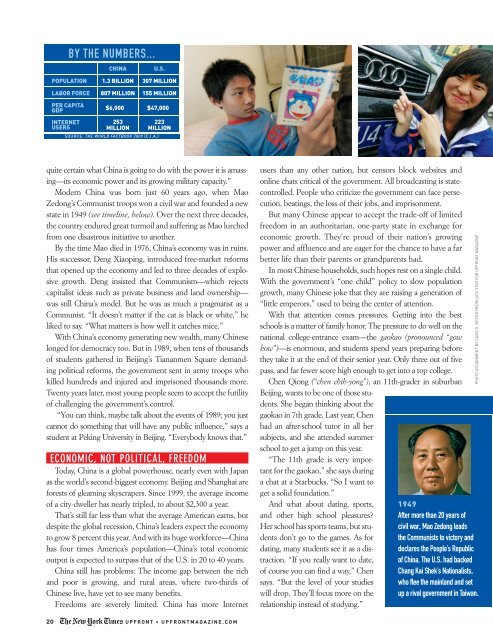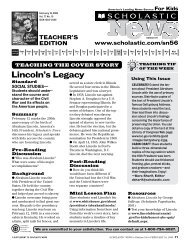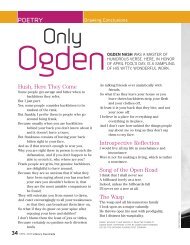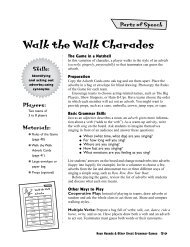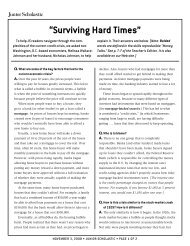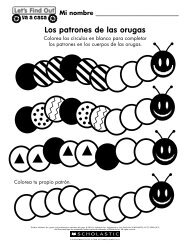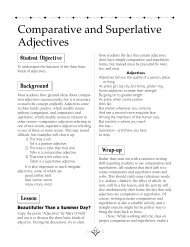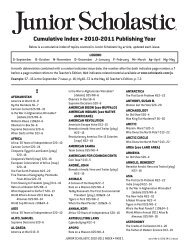3billion - Scholastic
3billion - Scholastic
3billion - Scholastic
You also want an ePaper? Increase the reach of your titles
YUMPU automatically turns print PDFs into web optimized ePapers that Google loves.
BY THE NUMBERS...<br />
PoPuLation<br />
Labor forCe<br />
Per CaPita<br />
GdP<br />
internet<br />
users<br />
China<br />
1.3 biLLion<br />
807 miLLion<br />
$6,000<br />
253<br />
miLLion<br />
SOURCE: The World FacTbook 2009 (C.I.A.)<br />
u.s.<br />
307 miLLion<br />
155 miLLion<br />
$47,000<br />
223<br />
miLLion<br />
quite certain what China is going to do with the power it is amassing—its<br />
economic power and its growing military capacity.”<br />
Modern China was born just 60 years ago, when Mao<br />
Zedong’s Communist troops won a civil war and founded a new<br />
state in 1949 (see timeline, below). Over the next three decades,<br />
the country endured great turmoil and suffering as Mao lurched<br />
from one disastrous initiative to another.<br />
By the time Mao died in 1976, China’s economy was in ruins.<br />
His successor, Deng Xiaoping, introduced free-market reforms<br />
that opened up the economy and led to three decades of explosive<br />
growth. Deng insisted that Communism—which rejects<br />
capitalist ideas such as private business and land ownership—<br />
was still China’s model. But he was as much a pragmatist as a<br />
Communist. “It doesn’t matter if the cat is black or white,” he<br />
liked to say. “What matters is how well it catches mice.”<br />
With China’s economy generating new wealth, many Chinese<br />
longed for democracy too. But in 1989, when tens of thousands<br />
of students gathered in Beijing’s Tiananmen Square demanding<br />
political reforms, the government sent in army troops who<br />
killed hundreds and injured and imprisoned thousands more.<br />
Twenty years later, most young people seem to accept the futility<br />
of challenging the government’s control.<br />
“You can think, maybe talk about the events of 1989; you just<br />
cannot do something that will have any public influence,” says a<br />
student at Peking University in Beijing. “Everybody knows that.”<br />
economic, not political, freedom<br />
Today, China is a global powerhouse, nearly even with Japan<br />
as the world’s second-biggest economy. Beijing and Shanghai are<br />
forests of gleaming skyscrapers. Since 1999, the average income<br />
of a city-dweller has nearly tripled, to about $2,300 a year.<br />
That’s still far less than what the average American earns, but<br />
despite the global recession, China’s leaders expect the economy<br />
to grow 8 percent this year. And with its huge workforce—China<br />
has four times America’s population—China’s total economic<br />
output is expected to surpass that of the U.S. in 20 to 40 years.<br />
China still has problems: The income gap between the rich<br />
and poor is growing, and rural areas, where two-thirds of<br />
Chinese live, have yet to see many benefits.<br />
Freedoms are severely limited. China has more Internet<br />
20 Upfront • Upfrontmagazine.com<br />
users than any other nation, but censors block websites and<br />
online chats critical of the government. All broadcasting is state-<br />
controlled. People who criticize the government can face persecution,<br />
beatings, the loss of their jobs, and imprisonment.<br />
But many Chinese appear to accept the trade-off of limited<br />
freedom in an authoritarian, one-party state in exchange for<br />
economic growth. They’re proud of their nation’s growing<br />
power and affluence and are eager for the chance to have a far<br />
better life than their parents or grandparents had.<br />
In most Chinese households, such hopes rest on a single child.<br />
With the government’s “one child” policy to slow population<br />
growth, many Chinese joke that they are raising a generation of<br />
“little emperors,” used to being the center of attention.<br />
With that attention comes pressures. Getting into the best<br />
schools is a matter of family honor. The pressure to do well on the<br />
national college-entrance exam—the gaokao (pronounced “gow<br />
kow”)—is enormous, and students spend years preparing before<br />
they take it at the end of their senior year. Only three out of five<br />
pass, and far fewer score high enough to get into a top college.<br />
Chen Qiong (“chen chih-yong”), an 11th-grader in suburban<br />
Beijing, wants to be one of those students.<br />
She began thinking about the<br />
gaokao in 7th grade. Last year, Chen<br />
had an after-school tutor in all her<br />
subjects, and she attended summer<br />
school to get a jump on this year.<br />
“The 11th grade is very important<br />
for the gaokao,” she says during<br />
a chat at a Starbucks. “So I want to<br />
get a solid foundation.”<br />
And what about dating, sports,<br />
and other high school pleasures?<br />
Her school has sports teams, but students<br />
don’t go to the games. As for<br />
dating, many students see it as a distraction.<br />
“If you really want to date,<br />
of course you can find a way,” Chen<br />
says. “But the level of your studies<br />
will drop. They’ll focus more on the<br />
relationship instead of studying.”<br />
PHOTO ASSIGNMENT BY DAVID G. MCYINTYRE/BLACK STAR FOR UPFRONT MAGAZINE<br />
1949<br />
After more than 20 years of<br />
civil war, Mao Zedong leads<br />
the Communists to victory and<br />
declares the People’s Republic<br />
of China. The U.S. had backed<br />
Chang Kai Shek’s Nationalists,<br />
who flee the mainland and set<br />
up a rival government in Taiwan.


